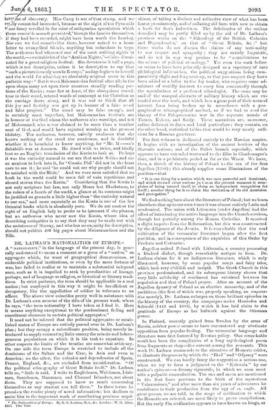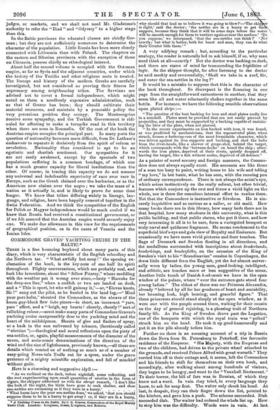DR, LATHAM'S NATIONALITIES OF EUROPE.* A " NATIONALITY," in the
language of the present day, is gene- rally understood to mean a remnant or a germ of a "nation," an aggregate which, for want of geographical demarcations, or endurable political institutions, or even by the mere fortune of war, has failed to realize or to maintain a substantial independ ence, such as it is impelled to seek by peculiarities of lineage, perhaps, and of language or religion, or historical or literary tradi- tions. In strict parlance, the term should be applicable to a real nation ; but employed in this Way it might be insufficient or derogatory, like the appellation of soldier in reference to an officer. The above view coincides pretty well in substance with Dr. Latham's own account of the title of his present work, where he says, "the term nationality I have taken as I find it. Here it means anything exceptional to the predominant feeling and constituent elements in certain political aggregates."
It need not be inferred that the political aggregates or estab- lished states of Europe are entirely passed over in Dr. Latham's plan ; but they occupy a subordinate position, being merely in- troduced to supply connecting links among the minute and hetero- geneous populations on which it is his task to expatiate. In other respects the limits of the treatise are somewhat arbitrary. On one side the term Europe is stretched to include all the dominions of the Sultan and the Czar, in Asia and even in America; on the other, the colonies and dependencies of Spain, France, England, Sze., are excluded from consideration. "Of the political ethnography of Great Britain itself," Dr. Latham tells us, "little is said. I write to Englishmen, Welshmen, Irish- men, Scotchtnen, Manomen, and Channel Islanders, not about them. They are supposed to know as much concerning themselves as any student can tell them." In these terms he promises the reader plenty of novel information; but declines to [mist him in the important work of recollecting precious acqui-
* The Nationalities of Europe. By It G. Latham, M.A., dz.:. London : W. IL Allen, 1863. Two Vols. sitions, of taking a distinct and collective view of what has been learnt promiscously, and of collating old facts with new to obtain a basis for fresh inductions. The deficiencies of the outline described may be partly filled up by the aid of Dr. Latham's previous works on the " Ethnology of the British Colonies and Dependencies," on that of " Great Britain, &c ;" but these works do not discuss the claims of any nationality to our respect and sympathy ; they are mainly linguistic,. and do not in any way profess to be "contributions to the science of political etMcology." Yet even the work before us seems to have been prim trily designed as a repertory of rare- philological inforinatioa, the political suggestions being com- paratively slight and fragmentary, so that you suspect they have
been added as a bribe to the lay reader, who requires some ad- mixture of worldly interest to carry him contentedly through the speculations of a prefessed ethnologist. The sauce may be said of the unequal abstracts of military history which are ex- tended over the work, and which lose a great part of their natural interest from being, broken up in accordance with a geo- graphical or ethnographical method, as if we had to read the- history of the Peloponnesian war in the separate annals of Thrace, Ettbxa, and Sicily. These narratives are, moreover,. rather deficient in dates and local particulars ; they contain, on the other hand, statistical tables that would be very nearly suffi- cient for a Russian gazetteer.
The first volume is dedicated entirely to the Russian empire.. It begins with an investigation of the ancient borders of the Slavonic nations, and of the Polish branch especially, which appears to have extended westward to the Elbe in Charlemagne's
time, and in it prehistoric period as far as the Weser. We have, then, a sketch of the history of Poland to the era of the firall
Jagellon (186); this already supplies some illustrations of the position—that
"It is one thing for a nation which was once powerful and dominant, and which treated other nations ju t as at the present moment it com- plains of being treated itself, to claim an independent recognition for- itself ; another thing for it to claim the restitution of its old dominion and prerogative."
We find nothing here about the literature of Poland ; but we learn elsewhere that up to our o wn times it was almost entirely Latin and academical. The union with Lithuania (under Jagellon) had the effect of introducing the native language into the Church services,, though but partially among the Roman Catholics. It received a slight impulse from the Reformation, but this was counteracted by the diligence of the Jentits. It is remarkable that the real cultivation of the vernacular literature began after the first.
partition, and in consequence of the expulsion of this Order by Frederic and Catharine.
Jagellon united Poland with Lithuania, a country possessing a kindred dialect, though remarkably antique in form. Dr.. Latham claims for it an indigenous literature, which is only
illustrated, however, by some popular songs and fairy tales, which look very childish and insipid. The Greek Church in this. province predominated, and its subsequent history shows that very little solidarity of sentiment has subsisted between ite population and that of Poland proper. After an account of the Jagellon dynasty of Poland as an elective monarchy, and of the partitions (the first of which was, properly speaking, an amputa- tion merely), Dr. Latham enlarges on those brilliant episodes in
the history of the country, the campaigns under Huniades and Sobieski (1443 and 1083), by wide!' it has laid claim to the gratitude of Europe as her bulwark against the Ottoman power.
In Finland, recently gained from Sweden by the arms or Russia, neither power seems to have encountered any obstinate opposition from popular feeling. The vernacular language and literature were first fostered by Russian policy. One remarkable result has been the compilation of a long mythological poen from fragments or rhapsodies current among the peasants. This work Dr. Latham commends to the attention of Homeric critics, to illustrate the process by which the "Iliad" and "Odyssey" were constructed. We can hardly fancy the suggestion a serious one, when we try to form a judgment on the " Kalevala " by our author's epitome—a dreamy rigmarole, in which we soon meet with a palpable contradiction. The sun and moon are mentioned
in the first lines previous to the birth of the mysterious " Vainainoinen," and after more than six years of adventures he contributes to their production from the egg of ar, eagle. All great poetics, we are told, in the stage of civilization to which the Homeric are referred, are most likely to prove compilations.
But the early Fin civilization appears to have known no kings, or
judges, or markets, and we shall not need Mr. Gladstone's authority to refer the "Bind" and "Odyssey" to a higher stage than this.
In the Baltic provinces the educated classes are chiefly Ger- man; but they are not sufficiently numerous to determine the character of the population. Little Russia has been more closely connected with Lithuania than with Poland. The chapters on the eastern and Siberian provinces, with the exception of those on Circassia, possess chiefly an ethnological interest.
About half the second volume is occupied with the Ottoman empire, as far as Syria and the adjacent countries, under which the history of the Yezidis and other religious sects is treated. The lineage and history of the modern Greeks are carefully investigated, but not considered as proving their fitness for supremacy among neighbouring tribes. The Servians are advised not to covet a formal independence, which might entail on them a needlessly expensive administration, such as that of Greece has been ; they should cultivate their material resources, and maintain by a peaceable policy the very precarious position they occupy. The Montenegrins receive some sympathy, and the Turkish Government is ridi- culed for affecting to make a turnpike road in this territory when there are none in Roumelia. Of the rest of the book the Austrian empire occupies the principal part. In many parts the question of nationality becomes more difficult, from Dr. Latham's endeavour to separate it decisively from the spirit of reform or revolution. Nationality thus considered is apt to be an egotistic and churlish sentiment. Our sympathies for it are not easily awakened, except by the spectacle of two populations suffering in a common bondage, of which one has a much greater capacity for liberal institutions than the other. Of course, in tracing this capacity we do not assume any universal and indefeasible superiority of race over race in Europe, such as the Greek claimed over the barbarian, or as the American now claims over the negro ; we take the mass of a nation as it actually is, and is likely to prove for some time longer. We know that tribes differing widely in lineage, lan- guage, and religion, have been happily cementad together in the Swiss Federation. And we think the sympathies of the English for Polish or Magyar independence would be much cooled if we knew that Russia had received a constitutional government, or if we felt assured that the Austrian empire would securely enjoy one. We make due allowance in this view for the requirements of geographical position, as in the cases of Venetia and the Ionian Isles.































 Previous page
Previous page